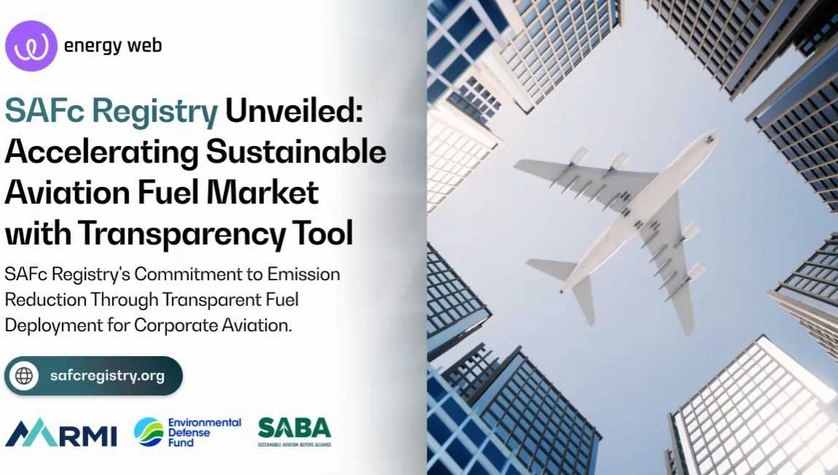Dubai, United Arab Emirates — December 6, 2023 — A new independent, not-for-profit sustainable aviation fuel certificate (SAFc) registry launched today at COP28, supporting major consumers of air travel and transport in their efforts to help directly decarbonize flight with an enterprise-grade digital tool. The registry was created by clean energy nonprofit RMI and the Environmental Defense Fund (EDF), in collaboration with the Sustainable Aviation Buyers Alliance (SABA) and digital solutions developer Energy Web.
The SAFc Registry connects corporate consumers, airlines, freight forwarders, and clean fuel producers in one universally accessible platform that will spur the use of sustainable aviation fuel (SAF) via the purchase of SAF certificates. Led by impartial nonprofits, the careful, transparent design of the registry builds on industry best practices and went through public consultation to ensure that the SAF certificates exchanged realize their intended environmental impact and can be claimed towards emissions reduction goals.
“The SAFc Registry is the culmination of RMI’s ongoing work to catalyze the sustainable aviation fuel market. By creating a throughline from corporate consumers to fuel producers, we can expand investment in SAF infrastructure and increase supply of low-carbon fuels. Voluntary uptake is critical to scaling a burgeoning market, and we hope this registry can serve as an example for other sectors in the future.” said Bryan Fisher, Managing Director at the clean energy nonprofit RMI.
SAF is made from renewable or waste materials and can decrease the lifecycle emissions of flight by more than 80%. However, the fuel is not yet widely available and carries a significant green price premium. The Registry helps address this market gap by connecting corporate demand for emissions reductions to SAF producers through an auditable ledger for certificates which decouples the emissions benefits of SAF use from the physical fuel supply. It is the final piece of market infrastructure — in addition to robust standards, accounting guidelines, and structured RFPs — to create a robust and de-risked market for SAFc investment.
“For corporations and airlines, no other registry offers full transparency and tracks sustainable aviation fuel integrity to ensure high impact in fighting climate emissions,” said Elizabeth Sturcken, Managing Director, Net Zero Value Chains, at EDF.
Major corporations that fly employees and goods around the world are urgently seeking ways to reduce the climate impacts from air transport. Emissions from travel, part of the “Scope 3” emissions in corporate emissions accounting, often represent the lion’s share of a business’ carbon footprint. SAF certificates enable companies to directly buy the auditable, credible emissions claims that represent a volume of sustainable aviation fuel displacing the same volume of conventional jet fuel for climate disclosures. These SAF certificates can be issued and retired in their name on the registry. Purchase of the certificates spurs fuel producers to invest in SAF production by sending a strong demand signal and creating a secondary value stream.
Major customers like Bank of America, Boom Supersonic, Boston Consulting Group, JPMorgan Chase & Co. and Meta have already banded together to collectively procure SAF certificates through SABA, an alliance of the world’s most ambitious corporations addressing the emissions of flight through collective action. Future joint procurement efforts can use the SAFc Registry to seamlessly ensure the delivery of SAF certificates and sustainability assurances to buyers.
“The SAFc Registry stands alone among other registries for being state-of-the-art, purely independent, and non-profit led. It should be the choice for any aviation customer looking to decarbonize their use of aviation,” said Kim Carnahan, Head of the SABA Secretariat and CEO of Neoteric Energy and Climate.
The open-source software behind the SAFc Registry was designed to deliver an intuitive experience and great transparency to end-users. Each action on the SAFc Registry is validated, scrubbed of sensitive data, and digitally recorded. For registry users, the public, and auditors, this represents a continuous audit of registry operations.
“We’re proud to support this best-in-class registry from inception and are already looking forward to new features focused on even easier ease-of-use and increased transparency,” said Jesse Morris, CEO at Energy Web.
RMI, EDF, SABA and Energy Web will provide a tour of the new registry in a webinar on December 12th, 2023, and show how SAFc can help organizations meet sustainability goals by supporting auditable claims in climate disclosures.
Notes to Editors
About RMI
RMI, founded as Rocky Mountain Institute, is an independent nonprofit founded in 1982 that transforms global energy systems through market-driven solutions to align with a 1.5°C future and secure a clean, prosperous, zero-carbon future for all. We work in the world’s most critical geographies and engage businesses, policymakers, communities, and NGOs to identify and scale energy system interventions that will cut greenhouse gas emissions at least 50 percent by 2030. RMI has offices in Basalt and Boulder, Colorado; New York City; Oakland, California; Washington, D.C.; and Beijing. More information on RMI can be found at www.rmi.org or LinkedIn.
About EDF
One of the world’s leading international nonprofit organizations, Environmental Defense Fund (edf.org) creates transformational solutions to the most serious environmental problems. To do so, EDF links science, economics, law, and innovative private-sector partnerships. With more than 3 million members and offices in the United States, China, Mexico, Indonesia and the European Union, EDF’s scientists, economists, attorneys and policy experts are working in 28 countries to turn our solutions into action. Connect with us on Twitter @EnvDefenseFund.
About SABA
The Sustainable Aviation Buyers Alliance (SABA) is a joint initiative of RMI and the Environmental Defense Fund focused on accelerating the path to net-zero aviation by driving investment in, and adoption of, high-integrity sustainable aviation fuel (SAF) and supporting companies, airlines, and freight customers in achieving their climate goals. More information on SABA can be found at flysaba.wpengine.com or follow us on LinkedIn.
About Energy Web
Energy Web is a global non-profit accelerating the clean energy transition by developing open-source technology solutions for energy systems. Our enterprise-grade solutions improve coordination across complex energy markets, unlocking the full potential of clean, distributed energy resources for businesses, grid operators, and customers. Our solutions for enterprise asset management, data exchange, and Green Proofs, our tool for registering and tracking low-carbon products, are underpinned by the Energy Web Chain, the world’s first public blockchain tailored to the energy sector. The Energy Web ecosystem comprises leading utilities, renewable energy developers, grid operators, corporate energy buyers, automotive, IoT, telecommunications leaders, and more. More information on Energy Web can be found at www.energyweb.org or follow us on Twitter @EnergyWebX












 All while Pfizer—a company with a $2.3 billion criminal fine for fraudulent marketing, bribery, and kickbacks—was given blanket immunity from liability and billions in taxpayer dollars to produce a vaccine in record time with no long-term safety data.
All while Pfizer—a company with a $2.3 billion criminal fine for fraudulent marketing, bribery, and kickbacks—was given blanket immunity from liability and billions in taxpayer dollars to produce a vaccine in record time with no long-term safety data.
























